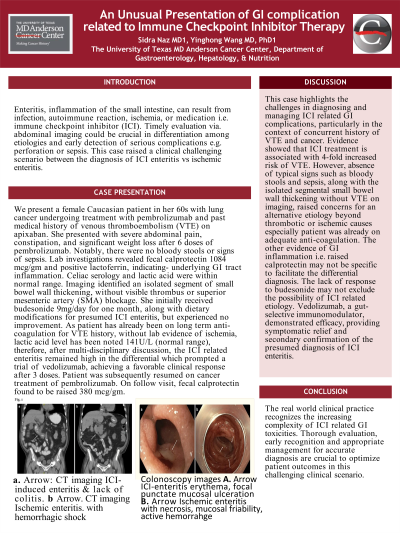Monday Poster Session
Category: Small Intestine
P2654 - An Unusual Presentation of GI Complication Related to Immune Checkpoint Inhibitor Therapy
Monday, October 23, 2023
10:30 AM - 4:15 PM PT
Location: Exhibit Hall

Has Audio

Sidra Naz, MD, MPH
University of Texas MD Anderson Cancer Center
Houston, TX
Presenting Author(s)
Sidra Naz, MD, MPH, Yinghong Wang, MD
University of Texas MD Anderson Cancer Center, Houston, TX
Introduction: Enteritis, inflammation of the small intestine, can result from infection, autoimmune reaction, ischemia, or medications immune checkpoint inhibitor (ICI). Early detection of serious complications perforation or sepsis is critical in such cases. This case raised a clinical challenge between the diagnosis of ICI enteritis vs ischemic enteritis.
Case Description/Methods: We present a female Caucasian patient in her 60s with lung cancer undergoing pembrolizumab therapy and past medical history of venous thromboembolism (VTE) on apixaban. She presented with severe abdominal pain, constipation, and significant weight loss after 6 doses of pembrolizumab. Notably, there were no bloody stools or signs of sepsis. Labs revealed fecal calprotectin 1084 mcg/gm and positive lactoferrin, indicating underlying GI tract inflammation. Celiac serology and lactic acid were within normal range. Imaging identified an isolated segment of small bowel wall thickening, without thrombus or superior mesenteric artery (SMA) blockage. She initially received budesonide 9mg/day for one month, along with dietary modifications for presumed ICI enteritis, but experienced no improvement. As patient has already been on long term anti-coagulation for VTE history, lactic acid level has been noted 141U/L (normal range), therefore, after multi-disciplinary discussion, the ICI enteritis remained high in the differential which prompted a trial of vedolizumab, achieving a favorable clinical response after 3 doses. Patient was subsequently resumed on cancer treatment of pembrolizumab.
Discussion: This case highlights the challenges in diagnosing and managing ICI related GI complications, particularly in the context of concurrent history of VTE and cancer. Evidence showed that ICI treatment is associated with 4-fold increased risk of VTE. However, absence of typical signs such as bloody stools and sepsis, along with the isolated segmental small bowel wall thickening without VTE on imaging, raised concerns for an etiology beyond thrombotic or ischemic causes especially patient was already on anti-coagulation. Vedolizumab, a gut-selective immunomodulator, demonstrated efficacy, providing symptomatic relief and secondary confirmation of the presumed diagnosis of ICI enteritis.
The real world clinical practice recognizes the increasing complexity of ICI related GI toxicities. Thorough evaluation, early recognition and appropriate management for accurate diagnosis are crucial to optimize patient outcomes in this challenging clinical scenario.
Disclosures:
Sidra Naz, MD, MPH, Yinghong Wang, MD. P2654 - An Unusual Presentation of GI Complication Related to Immune Checkpoint Inhibitor Therapy, ACG 2023 Annual Scientific Meeting Abstracts. Vancouver, BC, Canada: American College of Gastroenterology.
University of Texas MD Anderson Cancer Center, Houston, TX
Introduction: Enteritis, inflammation of the small intestine, can result from infection, autoimmune reaction, ischemia, or medications immune checkpoint inhibitor (ICI). Early detection of serious complications perforation or sepsis is critical in such cases. This case raised a clinical challenge between the diagnosis of ICI enteritis vs ischemic enteritis.
Case Description/Methods: We present a female Caucasian patient in her 60s with lung cancer undergoing pembrolizumab therapy and past medical history of venous thromboembolism (VTE) on apixaban. She presented with severe abdominal pain, constipation, and significant weight loss after 6 doses of pembrolizumab. Notably, there were no bloody stools or signs of sepsis. Labs revealed fecal calprotectin 1084 mcg/gm and positive lactoferrin, indicating underlying GI tract inflammation. Celiac serology and lactic acid were within normal range. Imaging identified an isolated segment of small bowel wall thickening, without thrombus or superior mesenteric artery (SMA) blockage. She initially received budesonide 9mg/day for one month, along with dietary modifications for presumed ICI enteritis, but experienced no improvement. As patient has already been on long term anti-coagulation for VTE history, lactic acid level has been noted 141U/L (normal range), therefore, after multi-disciplinary discussion, the ICI enteritis remained high in the differential which prompted a trial of vedolizumab, achieving a favorable clinical response after 3 doses. Patient was subsequently resumed on cancer treatment of pembrolizumab.
Discussion: This case highlights the challenges in diagnosing and managing ICI related GI complications, particularly in the context of concurrent history of VTE and cancer. Evidence showed that ICI treatment is associated with 4-fold increased risk of VTE. However, absence of typical signs such as bloody stools and sepsis, along with the isolated segmental small bowel wall thickening without VTE on imaging, raised concerns for an etiology beyond thrombotic or ischemic causes especially patient was already on anti-coagulation. Vedolizumab, a gut-selective immunomodulator, demonstrated efficacy, providing symptomatic relief and secondary confirmation of the presumed diagnosis of ICI enteritis.
The real world clinical practice recognizes the increasing complexity of ICI related GI toxicities. Thorough evaluation, early recognition and appropriate management for accurate diagnosis are crucial to optimize patient outcomes in this challenging clinical scenario.
Disclosures:
Sidra Naz indicated no relevant financial relationships.
Yinghong Wang: ilyapharma – Consultant. IOTA – Consultant. Janssen – Consultant. MabQuest – Advisory Committee/Board Member. Sorriso – Consultant. Tillotts – Consultant.
Sidra Naz, MD, MPH, Yinghong Wang, MD. P2654 - An Unusual Presentation of GI Complication Related to Immune Checkpoint Inhibitor Therapy, ACG 2023 Annual Scientific Meeting Abstracts. Vancouver, BC, Canada: American College of Gastroenterology.
